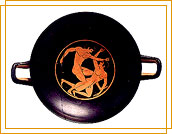Wrestling
It is the older and most popular sport in the world. Its first description can be found in Homer's Iliad, at the funerary contests organized in honor of Patroclus, Achilles' friend, where the hero Ajax, son of Telamon, wrestled with Odysseus, king of Ithaca.  According to mythology, it was Theseus who invented the rules of wrestling, when he fought and killed Kerkyon. According to mythology, it was Theseus who invented the rules of wrestling, when he fought and killed Kerkyon.
Wrestling as an independent sport and as part of the pentathlon was introduced in the Olympic Games of 708 BC, while the wrestling of boys was introduced in 632 BC. They regarded it highly as a form of military exercise. This sport was divided into orthia pale (standing wrestling) and kato pale (ground wrestling). The wrestlers in the beginning stood opposite one another with their feet bent and slightly open, a stance that was called systasis or parathesis. Contrary to present day practice, there was no system of gradation and no differentiation depending on the weight of the athletes.
Standing wrestling
The objective of this type of wrestling was simply to throw the opponent on the ground. Three falls signified the defeat and the winner was called triakter. The contest continued until one of the athletes fell to the ground and could not raise himself up. In this type of wrestling the athletes exercised their upper body (head, neck, shoulders, hands, chest, waist).
Ground wrestling
The contest came to an end when one of the athletes raised his right hand with his index pointed, signifying defeat. This type of wrestling exercised mainly the lower part of the body (waist, thighs and knees) and the hands.
|
